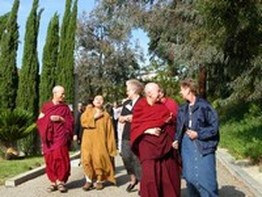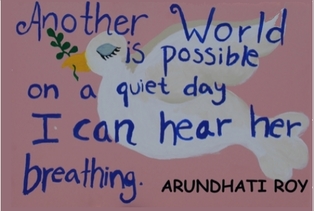
I have been a nun, or more accurately a religious sister, for 50 years and no longer wear a habit but I have often been invited to talk on 'Why I Became Nun'. These invitations have come mostly from Presbyerian Churches who seem to be a bit intrigued by the life of a nun, though many Catholics still don't understand why sisters changed out of the habit and now appear to be living a very ordinary life - the answer is that our intention is not to make ourselves different or cut ourselves off from the rest of society but to live a life of service and commitment through the vows of poverty, chastity and obedience. I've also found Muslims baffled by a life that embraces celibacy as procreation for them is seen as a divine obligation. Recently I found myself telling an Ayatollah that I was a sister because I felt such strong attraction to God and things spiritual to the extent that God was the love of my life. I suprised myself with this comment but realise it's true even though I don't know who or what God is.
This attraction is felt by others who don't have a sense of a personal God but the desire to commit one's only life to whatever is absolute is as much part of a Buddhist nun's life as a Christian's. In dialogue with Buddhist nuns I have felt a real sense of sisterhood and solidarity and while the language and pattern of life might be different the reality at the heart of it seems to be very much the same. I've not had the same experience in talking with Hindu nuns but I'm sure the experience would be the same. It's this sameness that made monastic interfaith dialogue so fruitful and it's this dialogue that paved the way for more formal dialogue in the Catholic Church.
While Islam has no formal religious life there have been women who have rebelled against the expectation of marriage and family to dedicate themselves totally to God. A favourite of mine is Rabia. Rabia lived in Iraq in 8th century, close to the beginnings of Islam, a bit like the desert mothers and fathers in Christianity who chose a committed way of life when Christianity became the religion of the Empire. She was born into a poor family, sold into slavery, lived a life of prayer and asceticism for a time and eventually recognised as a great saint. Miracles were associated with her like the story of a holy man, Ibrahim b, Adham, who spent fourteen years travelling to the Kaba'ah, praying on every step. When he arrived, the Kaba'ah was not there because it had gone to meet Rabia who was also on her way to Mecca. Rabia's reputed comment was " you traversed it with ritual prayer but I with personal supplication..........The Kaba'ah which I see has no power over me. What joy does the beauty of the Kaba'ah bring to me?" For Rabia true religion was not focussed on religious ritual but on a personal relationship with God which would bring about inner and personal transformation. She realised that religion can become an end in itself and block relationships with God. " Sufyan would be a good man if only he did not love the Traditions", she is reported to have said.
In this way Rabia fits well into the tradition of religious life which is prophetic in that it challenges religious systems that are always in danger of becoming institutionalised and focussing on their own survival. It points to the heart of religion - human flourishing and well-being. Religions would be the poorer without it and any sign that there's a renewed interest in it is a good thing.





 RSS Feed
RSS Feed
